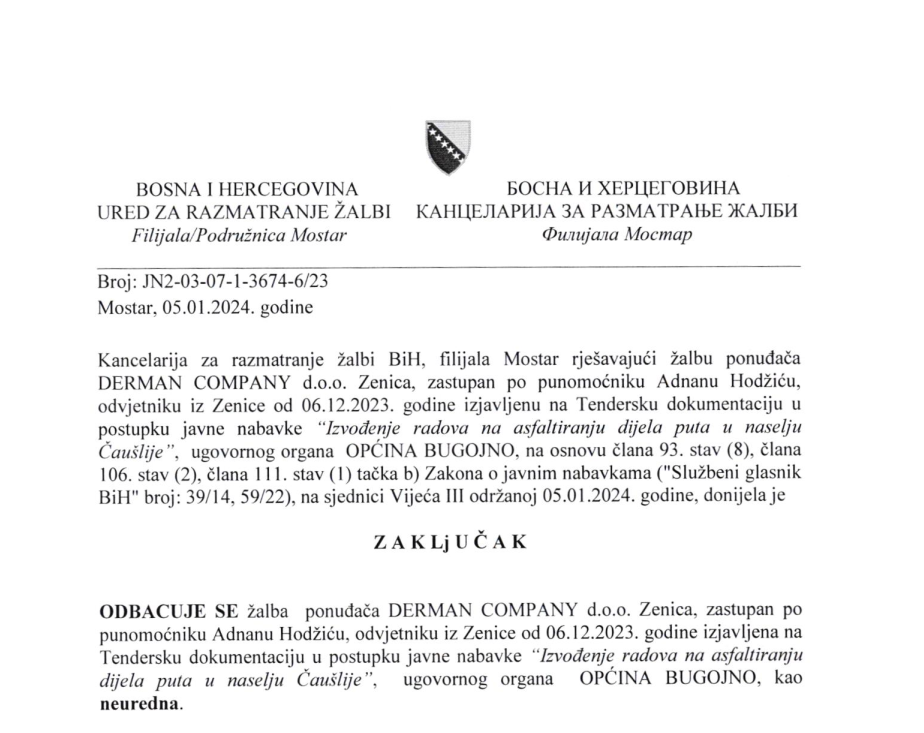Anti-corruption campaigners are taking tenders down for the compensation

The professional appellants took advantage of the fact that the law does not limit the number of appeals, nor obligate them to submit offers and have launched a business that brings them regular income every month
Public procurement sector in Bosnia and Herzegovina has caught on overproduction of appeals that have been filed by professional appellants. The problem is taking on the shape of a pandemic, so experts are proposing urgent changes to the law, while the authorities are reporting a number of lawyers to the prosecutor’s office.
These are small companies that follow hundreds of tenders daily and look for a slightest mistake based on which they appeal to the contracting authority. If their appeal is upheld, the lawyers who represent them are entitled to a compensation, which ranges from BAM 280 to BAM 560 depending on the entity.
Their only objective is the compensation, since they almost never come forward with any bid related to the public procurement after their appeal is upheld, which according to CAPITAL’s interlocutors clearly demonstrates that they have no interest to participate in the procedure.
The professional appellants took advantage of the fact that the law does not limit the number of appeals, nor obligate them to submit offers and have launched a business that brings them regular income every month.
They do not seen anything controversial in that. Some of even present themselves as anti-corruption campaigners and a corrective factor, and call on the authorities to sanction them if they are committing any crime.
They appeal about everything and anything
It is interesting that some of them have, before embarking on this journey, advocated clear and fair rules of the game and a new Public Procurement Law, which they are currently extensively using.
Igor Vukajlović is the former secretary of the association “Tender”, a non-government organization that advocated transparent and efficient public procurement, and he is director of the company “FCT” Banja Luka
This company, whose main activity is business consulting, was established in February 2021, and it appeals about literary everything and anything through its lawyer Željko Višić.
Višić file appeals on behalf of FCT concerning procurement of heating oil, water pipes and connections, food products, air conditioners. They also filed appeals regarding procurement of mining machinery parts, procurement of meat, electrical installation material, hot water boilers, but also regarding maintenance of fiscal devices and alike.
Contracting authorities that rejected their appeals have, according to the regular procedure prescribed by law, forwarded the appeals to the Procurement Review Board (PRB) of BiH. The data shows that in only a few years of its existence “FCT” has reached the number of 650 appeals filed with the PRB.
However, most of them were dismissed by this body because the administrative fee for initiating the review procedure was not paid.
Well informed source of CAPITAL explains why this is happening.
“Appellants’ goal is to end everything in a first-instance procedure with the contracting authority. An administrative fee, which sometimes goes up to ten thousand marks, has to be paid once the appeal is forwarded to the PRP. It is a lot of money for them and they are not willing to take a risk so they back down because they have enough procurements in the system to which they can appeal and for which they have everything prepared since they do it professionally”, said our source.
Vukajlović didn’t want to talk about his business affairs for CAPITAL, and neither did lawyer Višić.
It is very interesting that at the time he was member of the association “Tender” Vukajlović had frequently criticized the BiH Public Procurement Law and warned about its shortcomings.
He claimed that the corruption in public procurement takes more than billion marks annually, and advocated higher penalties for numerous oversights in these processes.
He also believed that it is necessary to increase level of transparency. He knows the public procurement system very well, which is proved by the fact that he is on the list of authorized lecturers on the web site of the BiH Public Procurement Agency.
“We are making them work in line with the law”
“FCT” is only one of the companies that is dedicated to appealing public procurement procedures.
The companies owned by Adis and Jasmina Kulačić from Zenica have lately been also overwhelming public enterprises and institutions in BiH with the complaints and appeals through the lawyer Adnan Hodžić, who comes from the same city and who, according to the information at CAPITAL’s disposal, has been reported to the competent prosecutor’s office.
They established company “Derman Company” in May of last year, and more than 200 of their appeals have been submitted to the Procurement Review Board of BiH in only nine months.
Their second company “Kula mont” was established in 2017. The PRB has documented 280 appeals of this company.
The decisions of the PRB show that they appealed the procedure for asphalt paving of a street in Bugojno, procurement of mini dumpers in Posušje, procurement of food products in the dorms, procurement of office supplies, instalment of joinery, roof repair.
They appealed to the Government of Republika Srpska regarding a tender for periodic inspection of the equipment and fire suppression system, and testing of employees’ knowledge.
Almost all appeals were dismissed since the administrative fees for initiating the review procedure have not been paid.

On the other hand the commercial register reveals that they have managed to collect costs of the appeal through “Kula mont” from the sports center “Salih Omerčević” in Cazin, kindergarten “Edina Čamdžić” in Kladanj, the district heating “Bijeljina”, the school of electrical engineering “Nikola Tesla” in Banjaluka and others.
Through the company “Derman Company” the lawyer collected costs relating to appeals from several elementary schools, but also from the Intelligence-Security Agency (OBA) BiH.
The oversights made by the contracting authorities are often banal.
For example, municipality Pelagićevo upheld their complaint concerning public procurement seeking a contractor for road reconstruction.
When preparing tender documents this local community did not include the possibility that a bidder has a rescheduling agreement concluded, which is clearly stated in the BiH Public Procurement Law.
Well-versed applicants noticed that, and the contracting authority upheld their appeal and accepted their request for payment of BAM 450 for the costs of appeal procedure.
Jasmina Kulačić, director of both family companies, believes that the problem doesn’t lie with them, but rather with the contracting authorities that are not working in line with the law.
She claims that their only goal is to make the contracting authority work in line with the law, and that a good portion of the tenders is rigged.
She also reveals where they find grounds for the appeals.
“Many requirements in the tender documents clearly indicate who is the potential suitable contractor or bidder. The requirements like licenses issued only in the Federation of BiH or RS, or in a certain canton, mandatory visit of the work site, gas station located up to one kilometer from the contracting authority indicate that the right to participate in that tender only have bidders with licenses issued in a particular place or coming from the specified territory. Shouldn’t the law provide equal opportunity, transparency and safety to all bidders,” said Kulačić.
She believes that the contracting authorities are solely to blame for the appeals they receive.
“If they didn’t use the above-mentioned clauses specifically to favor certain suppliers, there would be no need to appeal. They compile the tender documents using the “copy-paste” system, and then they have the same violation of the law in all procedures. Although they uphold the appeal for one particular violation, they repeat the same violation in the next procedure already. There are countless examples where, with our appeal, we had forced contracting authorities to conduct public procurement in accordance with the law,” said Kulačić.
She has found a justification for her actions in the Criminal Procedure Code, and claims that all of this has jeopardized her privacy, but also safety of her children and family.
“If my responsibility lies in the fact that I report those who are not working in line with the law, then I accept it,” she concluded.
Agency: The law is circumvented, we will preserve the integrity of public procurement
The Public Procurement Agency (PPA) of BiH says that they are aware of the escalation of the problem, and that they will preserve integrity of public procurements.
They say that the analysis has shown that the lawyers file a great number of appeals on behalf of the company, and the objective is not to correct a mistake in the tender and get the contract, but to slow down the tender and eventually collect the costs for filing of the appeal.

“It inevitably leads to having the procurement procedure delayed and prolonged, clearly unfairly and unjustifiably, causing many negative consequences for public funds and the fund’s beneficiaries at all levels of authority in Bosnia and Herzegovina, such as postponement of the construction of infrastructure facilities, lack of medicines and medical equipment, inability to provide health care and other services, etc.”, warns the Agency.
They also add that the competent prosecutor’s offices, chambers of commerce, bar associations, BiH Competition Council, BiH Procurement Review Board, the Court of BiH and others must also address this problem.
“In order to protect the integrity of the public procurement system and the public funds from misuse, as well as to protect the code of professions and the law, we invite contracting authorities, bidders, lawyers, civil society, the media and those who have information and evidence about the aforementioned situations of “professional appellants”, to submit them officially, with evidence, both to the Agency and directly to all relevant institutions with the aim of combating and suppressing the indicated occurrence and phenomenon,” said the Agency.
Amendments to the law are necessary
Lawyer Dražen Vidaković from Banjaluka, who is very familiar with the public procurement system, has in his interview for CAPITAL presented several proposals to address this issue. All of them concern the amendments to the BiH Public Procurement Law.
Contrary to the current situation, the PRB should, in his opinion, be the first instance body for the appellants, and not the contracting authority.
Additionally, PRB should be obligated to notify the contracting body about the appeal due to the suspensive effect of the appeal.
The second amendment refers to having the appellant file the proof of payment of the administrative fee for initiating the review procedure together with the appeal, and the obligation of the PRB to dismiss the appeal if no proof of payment was filed, without inviting the appellant to supplement it.
The third amendment concerns Article 108, paragraph (6) of the Law, which, among other things, stipulates that administrative fee is non-refundable in the event of an unfounded appeal. According to Vidaković, the provision should be reformulated in such a way that the paid fee is reimbursed only in the case of a well-founded appeal.
According to him, this is a key moment for reducing appeals.
“According to the current provisions only PRB, and not the contracting authority through which the appeal is filed, can check if the fee was paid. In a situation like that the appellant does not suffer any adverse consequences by filing an appeal until the PRB substantively rejects the appeal as unfounded, in which case the appellant loses the right to reimbursement of the funds paid,” explained Vidaković.
Vidaković states that there is currently no way to forcefully collect an administrative fee for initiating review procedure, and that the paid fee is non-refundable only in the case of an unfounded appeal, so the appellant can practically discontinue the appeal, which ultimately will not lead to any adverse consequences for the appellant.
“If the appellants were to be obligated to pay the fee for initiating review procedure in advance, to submit proof of payment together with the appeal, and if the paid fee is reimbursed only in the event that the appeal is founded, professional appellants would be left without the only weapon they have, and it is the lack of adverse consequences for negligent filing of the appeals”, concluded Vidaković.
By the way, Bosnia and Herzegovina is the country that has by far the highest number of filed appeals of all the surrounding countries.

The annual reports on PRB’s operations show that the number of appeals received has grown every year since the adoption of the 2014 Law, and over the past few years the PRB has received more than 3.500 annually.
The last available data are for the year 2022, in which 3.721 appeals were received.










 Troje mrtvih u padu helikoptera, među njima direktor kompanije koja proizvodi suho meso
Troje mrtvih u padu helikoptera, među njima direktor kompanije koja proizvodi suho meso 